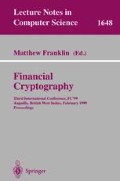Abstract
We present a series of protocols for authenticating an in- dividual’s membership in a group without revealing that individual’s identity and without restricting how the membership of the group may be changed. In systems using these protocols a single message to the authenticator may be used by an individual to replace her lost key or by a trusted third party to add and remove members of the group. Ap- plications in electronic commerce and communication can thus use these protocols to provide anonymous authentication while accommodating frequent changes in membership. We build these protocols on top of a new primitive: the verifiably common secret encoding. We show a con- struction for this primitive, the security of which is based on the existence of public-key cryptosystems capable of securely encoding multiple mes- sages containing the same plaintext. Because the size of our construct grows linearly with the number of members in the group, we describe techniques for partitioning groups to improve performance.
Access this chapter
Tax calculation will be finalised at checkout
Purchases are for personal use only
Preview
Unable to display preview. Download preview PDF.
References
Anonymizer, Inc., http://www.anonymizer.com
M. Blum and S. Goldwasser, “An Efficient Probabilistic Public-Key Encryption Scheme which Hides All Partial Information,” Advances of Cryptology-CRYPTO’ 84 Proceedings, Springer-Verlag, pp. 289–299.
J. Camenisch and M. Stadler, “Efficient Group Signature Schemes for Large Groups,” Advances in Cryptology-CRYPTO’ 97 Proceedings, Springer-Verlag, v. 1294, pp. 410–424
D. Chaum, “Untraceable Electronic Mail, Return Addresses, and Digital Pseudonyms,” Communications of the ACM, v. 24, n. 2, Feb 1981, pp. 84–88.
D. Chaum, “Security without Identification: Card Computers to make Big Brother Obsolete,” Communications of the ACM, v. 28, n. 10, Oct 1985, pp.1030–1044.
D. Chaum, A. Fiat, and M. Naor, “Untraceable Electronic Cash,” Advances in Cryptology-CRYPTO’ 88 Proceedings, Springer-Verlag, pp. 319–327.
D. Chaum and E. van Heyst, “Group signatures,” Advances in Cryptology-EUROCRYPT’ 91 Proceedings, Springer-Verlag, pp. 257–265.
D. Coppersmith, “Small Solutions to Polynomial Equations, and Low Exponent RSA Vulnerabilities,” Journal of Cryptography, v. 10 n. 4, Autumn 1997, pp. 233–260.
R. Cramer, I. Damgard, B. Schoenmakers, “Proofs of partial knowledge and simplified design of witness hiding protocols,” Advances in Cryptology-CRYPTO’ 94 Proceedings, pp.174–187.
A. De Santis, G. Di Crescenzo, G. Persiano, “Communication-efficient anonymous group identification,” 5th ACM Conference on Computer and Communications Security, November 1998, pp.73–82.
A. De Santis, G. Di Crescenzo, G. Persiano, M. Yung, “On monotone formula closure of SZK,” FOCS’ 94.
S. Goldwasser and S. Micali, “Probabilistic Encryption,” Journal of Computer and Systems Sciences, v. 28 n. 2, Apr 1984, pp.270–299.
J. Hastad and A. Shamir, “On Using RSA with Low Exponent in a Public Key Network,” Advances in Cryptology-CRYPTO’ 85 Proceedings, Springer-Verlag, pp.403–408.
J. Hastad, “Solving Simultaneous Modular Equations of Low Degree,” SIAM Journal on Computing, v. 17 no. 2, Apr 1988, pp. 336–341.
J. Kilian and E. Petrank, “Identity Escrow,” Advances in Cryptology-CRYPTO’ 98 Proceedings, Springer-Verlag, pp.167–185.
M. Reed, P. Syverson, and D. Goldschlag, “Anonymous Connections and Onion Routing,” IEEE Journal on Selected Areas in Communication Special Issue on Copyright and Privacy Protection, 1998.
M. Reiter and A. Rubin, “Crowds: Anonymity for Web Transactions” DIMACS Technical Report 97-15, Apr 1997.
P. Syverson, S. Stubblebine, and D. Goldschlag. “Unlinkable Serial Transactions,” Financial Cryptography’ 97, Feb 1997.
The Wall Street Journal Online, http://www.wsj.com.
Author information
Authors and Affiliations
Editor information
Editors and Affiliations
Rights and permissions
Copyright information
© 1999 Springer-Verlag Berlin Heidelberg
About this paper
Cite this paper
Schechter, S., Parnell, T., Hartemink, A. (1999). Anonymous Authentication of Membership in Dynamic Groups. In: Franklin, M. (eds) Financial Cryptography. FC 1999. Lecture Notes in Computer Science, vol 1648. Springer, Berlin, Heidelberg. https://doi.org/10.1007/3-540-48390-X_14
Download citation
DOI: https://doi.org/10.1007/3-540-48390-X_14
Published:
Publisher Name: Springer, Berlin, Heidelberg
Print ISBN: 978-3-540-66362-1
Online ISBN: 978-3-540-48390-8
eBook Packages: Springer Book Archive

